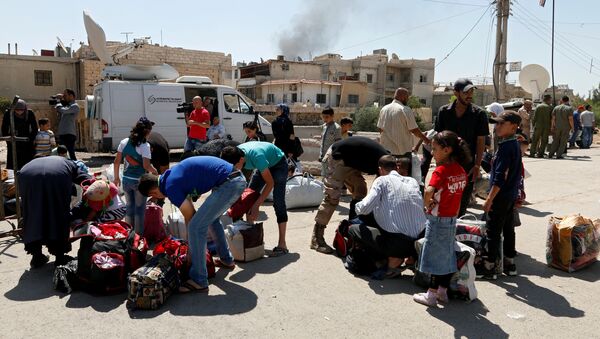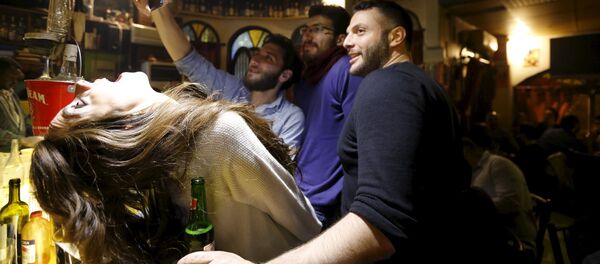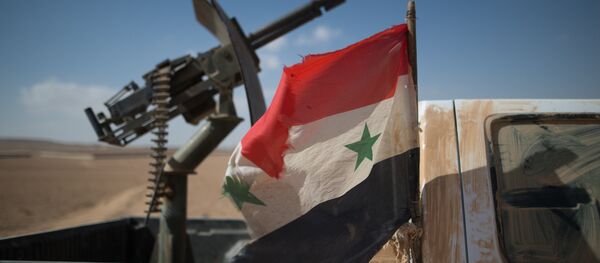DAMASCUS (Sputnik) — Under the agreement, all the militants who were ready to return back to peaceful life had to surrender their arms, while those who intended to continue fighting were provided a safe passage along with their families to the Idlib province.
Following their withdrawal, huge crowds of people started arriving at the Syrian army checkpoint near the city, anxiously longing to return to their homes.
A Sputnik’s correspondent was the first journalist to enter the city after the war that has started five years ago.
City Healing Its Wounds
However, Moadamiyeh was not damaged too severely, compared to the other cities where heavy fighting took place. A large percentage of the buildings remained intact and habitable. In addition to that, the majority of the workshops and other privately owned businesses are operating again.
Schools have also re-opened their doors to welcome students who insist on their right to learn despite all the horrors they have been through.
No More Weapons
The city’s mayor, Mahmoud Jalab, explained to the Sputnik’s correspondent the stages of the reconciliation process, which began in 2014.
The process sped up after the similar plan was carried out in another Damascus suburb, Darayya. The government then offered the militants in Moadamiyeh the choice between staying in Moadamiyeh with their arms laid down or leaving the city for Idlib.
“Around 1,500 militants along with their families chose to leave the city and go to Idlib and after that, the settlement process accelerated, as all the militants who chose to remain in the city handed over their weapons voluntarily and all these weapons, heavy or light, were taken away,” Jalab said, explaining that Moadamiyeh is currently totally weapon-free.
We Are Nothing but Tools in This War
Khaled Khodor, nicknamed “The Mayor”, a 45 year-old ceramic vendor before the war who became the commander of an armed brigade, was at the same army checkpoint. He spoke to Sputnik about his unit.
“The brigade consisted of 1,200 members and it was the biggest armed faction in Moadamiyeh. 300 militants decided to leave for Idlib because they did not believe that the reconciliation agreement would work,” Khodor said.
He added that Moadamiyeh is currently safe with its gates open to receive the residents and it is expected to be an example of the reconciliation process for the other regions to follow.
Militants in Moadamiyeh belonged to different segments of the Syrian society, and the members of the armed groups were former doctors, manual workers, students, drivers, barbers and other men belonging to different professions that were not related to war or fighting.
Mohammad Khalifa, a 27 year-old doctor, was one of these militants. Khalifa worked as the financial officer in the Fajer brigade. He told Sputnik that militants had no control over the causes of the conflict or the course it took.
"In 2013, we had no choice other than war, because we couldn't communicate with the government, and weren't able to find any channel to reach the government," Khalifa said.
He added, "We immediately understood since the beginning of the war, in Moadamiyeh in particular, that we were just tools in this war, and the minute we had the chance to start the dialogue with the government, we immediately grasped this opportunity."
Ready to Support Government in Fight Against Daesh
Khalifa said that the former opposition fighters now wanted to support the Syrian army in its fight against Daesh, a terrorist group banned in Russia and many other countries.
"Daesh has attracted fighters through money and only a very small percentage of the fighters have joined because of Daesh propaganda," he added.
Khalifa revealed that he had stayed in touch with the militants who left for Idlib, noting that around 95 percent of them are currently at the Syrian-Turkish border trying to leave the country. He said that they left Moadamiyeh not to continue fighting but to flee.
New Chapter
The city of Moadamiyeh is now beginning a new chapter, ready to restore the peace and harmony the city had before the war.
“Moadamiyeh used to include all factions of the Syrian society and we all used to live together peacefully and we were all one family,” Khalifa said.
The city’s government institutions will officially resume working after the upcoming visit of the governor of Damascus, hoping to leave years of suffering behind and set the example for other Syrian cities and villages.




